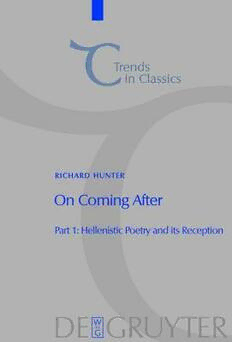
On Coming After: Studies in Post-Classical Greek Literature and Its Reception PDF
Preview On Coming After: Studies in Post-Classical Greek Literature and Its Reception
Richard Hunter On Coming After Part1 ≥ - Trends in Classics Supplementary Volumes Edited by Franco Montanari and Antonios Rengakos Scientific Committee Alberto Bernabe´ · Margarethe Billerbeck · Claude Calame Philip R. Hardie · Stephen J. Harrison · Stephen Hinds Richard Hunter · Christina Kraus · Giuseppe Mastromarco Gregory Nagy · Theodore D. Papanghelis · Giusto Picone Kurt Raaflaub · Bernhard Zimmermann Volume 3/1 Walter de Gruyter · Berlin · New York On Coming After Studies in Post-Classical Greek Literature and its Reception by Richard Hunter Part 1 Hellenistic Poetry and its Reception Walter de Gruyter · Berlin · New York (cid:2)(cid:2) Printedonacid-freepaperwhichfallswithintheguidelinesoftheANSI toensurepermanenceanddurability. ISBN 978-3-11-020441-4 LibraryofCongressCataloging-in-PublicationData ACIPcataloguerecordforthisbookisavailablefromtheLibraryofCongress. BibliographicinformationpublishedbytheDeutscheNationalbibliothek TheDeutscheNationalbibliothekliststhispublicationintheDeutscheNationalbibliografie; detailedbibliographicdataareavailableintheInternetathttp://dnb.d-nb.de. (cid:2) Copyright2008byWalterdeGruyterGmbH&Co.KG,D-10785Berlin Allrightsreserved,includingthoseoftranslationintoforeignlanguages.Nopartofthisbook may be reproduced or transmitted in any form or by any means, electronic or mechanical, includingphotocopy,recordingoranyinformationstorageandretrievalsystem,withoutpermis- sioninwritingfromthepublisher. PrintedinGermany CoverDesign:ChristopherSchneider,Berlin Printingandbinding:Hubert&Co.GmbH&Co.KG,Göttingen Contents Part 1 Preface .............................................. IX Introduction ......................................... 1 On Coming After ..................................... 8 Hellenistic Poetry and its Reception 1. ApolloandtheArgonauts:TwonotesonAp.Rhod.2,669–719 29 2. Medea’s flight: the fourth Book of the Argonautica ........ 42 3. ‘Short on heroics’: Jason in the Argonautica .............. 59 4. Winged Callimachus ............................... 86 5. Bulls and Boxers in Apollonius and Vergil .............. 89 6. Greek and Non-Greek in the Argonautica of Apollonius .... 95 7. Callimachus and Heraclitus .......................... 115 8. WritingtheGod:FormandMeaninginCallimachus,Hymnto Athena ........................................... 127 9. Written in theStars: Poetryand Philosophy in the Phainomena of Aratus ......................................... 153 10. The Presentation of Herodas’ Mimiamboi ................ 189 11. Callimachean Echoes in Catullus 65 ................... 206 12. Plautus and Herodas ................................ 212 13. Bion and Theocritus: a note on Lament for Adonis v. 55 .... 229 VI Contents 14. Mime and mimesis: Theocritus, Idyll 15 ................ 233 15. The Divine and Human Map of the Argonautica .......... 257 16. Callimachus swings (frr.178 and 43 Pf.) ................ 278 17. Before and after epic: Theocritus (?), Idyll 25 ............ 290 18. (B)ionic man: Callimachus’ iambic programme ........... 311 19. The Poet Unleaved. Simonides and Callimachus .......... 326 20. The Poetics of Narrative in the Argonautica .............. 343 21. Virgil and Theocritus: A Note on the Reception of the Encomium to Ptolemy Philadelphus ...................... 378 22. The Sense of an Author: Theocritus and [Theocritus] ..... 384 23. Imaginary Gods? Poetic theology in the Hymns of Callimachus ...................................... 405 24. Theocritus and the Style of Cultural Change ............ 434 25. Notes on the Lithika of Poseidippos ................... 457 26. The Hesiodic Catalogue and Hellenistic Poetry ........... 470 27. The prologue of the Periodos to Nicomedes (‘Pseudo-Scymnus’) 503 28. Sweet nothings – Callimachus fr.1.9–12 revisited ........ 523 29. The Reputation of Callimachus ....................... 537 30. Hesiod, Callimachus, and the invention of morality ....... 559 Contents VII Part 2 Comedy and Performance 31. The Comic Chorus in the fourth century ............... 575 32. Philemon, Plautus and the Trinummus .................. 593 33. The Aulularia of Plautus and its Greek original ........... 612 34. Middle Comedy and the Amphitruo of Plautus ........... 627 35. ‘Acting down’: the ideology of Hellenistic performance .... 643 36. Showing and telling: notes from the boundary ........... 663 Greek Poetry of the Roman Empire 37. Generic consciousness in the Orphic Argonautica? .......... 681 38. Aspects of technique and style in the Periegesis of Dionysius . 700 39. The Periegesis of Dionysius and the traditions of Hellenistic poetry ........................................... 718 The Ancient Novel 40. History and Historicity in the Romance of Chariton ...... 737 41. Longus and Plato .................................. 775 42. Growing up in the ancient novels: a response ............ 790 43. The Aithiopika of Heliodorus: beyond interpretation?...... 804 44. ‘Philip the Philosopher’ on the Aithiopika of Heliodorus ... 829 45. Plato’s Symposium and the traditions of ancient fiction ..... 845 46. Isis and the Language of Aesop ....................... 867 VIII Contents 47. The curious incident …: polypragmosyne and the ancient novel 884 General Index ........................................ 897 Passages Index ........................................ 902 Preface A collection such as this probably requires an apology more than a Preface, but I hope that the bringing together of these pieces from the last thirty years will at least be found useful by students of ancient literature. The remarkable recent growth of collected volumes, ‘com- panions’, and conference papers perhaps gives volumes such as this more justification than some may have had in the past. I have resisted the temptation to revise (contenting myself with a few addenda and the up-dating of some references), even where the follies of past years seemedtodemandcorrection,inpartbecause,oncestartedontheproc- ess of revision, ‘where do you stop?’ becomes an ever more insistent question. In particular, it should be noted that the bibliographical and editorial conventions of the original publications (including the spelling of ancient names) have been very largely preserved. This book would never have appeared without the remarkable and selfless labours of Antonios Rengakos, one of the Editors of Trends in Classics, and Evangelos Karakasis, both of who advised, scanned, edited and corrected with apparently indefatigable, and extraordinarily cheer- ful, carefulness; I am very much in the debt of these two friends, whose work on this project I have found very moving. I am also very grateful to Sabine Vogt of Walter de Gruyter Verlag for her support and encouragement at every stage, and to the editors and publishers of the original articles for the permission to reprint them here.
